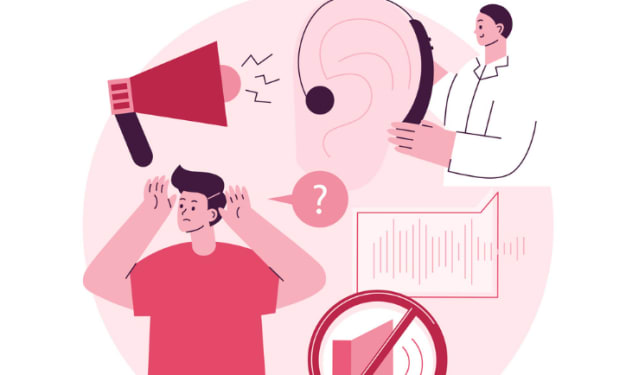Content warning
This story may contain sensitive material or discuss topics that some readers may find distressing. Reader discretion is advised. The views and opinions expressed in this story are those of the author and do not necessarily reflect the official policy or position of Vocal.
9 Proven Ways to Lose Weight Without Diet or Exercise
Losing weight doesn't always require a strict diet or rigorous exercise routine. There are several effective, science-backed strategies to help you consume fewer calories effortlessly. These methods can aid in weight loss and prevent future weight gain. Here are nine proven ways to shed pounds without traditional dieting or exercise:

if you need weight loss supplement click here
Losing weight doesn't always require a strict diet or rigorous exercise routine. There are several effective, science-backed strategies to help you consume fewer calories effortlessly. These methods can aid in weight loss and prevent future weight gain. Here are nine proven ways to shed pounds without traditional dieting or exercise:
- Chew Thoroughly and Slow Down Your brain needs time to register that you're full. Chewing food thoroughly and eating slowly can decrease overall food intake, increase feelings of fullness, and lead to smaller portion sizes. Studies show that slow eaters tend to have lower body mass indexes (BMIs) compared to those who eat quickly. Counting the number of chews per bite can help establish this habit. IF YOU NEED PRINTED KETO DIET BOOK,CLICK HERE
- Use Smaller Plates for High-Calorie Foods Plate sizes have increased over the years, which may contribute to overeating. Using smaller plates can make portions appear larger, helping you eat less. Conversely, larger plates can make food servings look smaller, prompting you to serve and consume more. Serve nutrient-dense, lower-calorie foods on larger plates and high-calorie foods on smaller ones.
- Eat Plenty of Protein Protein can significantly impact appetite by increasing fullness, reducing hunger, and decreasing calorie intake. It influences hormones related to hunger and satiety, like ghrelin and GLP-1. High-protein diets have been linked to greater weight loss. Incorporating protein-rich foods like chicken breasts, fish, Greek yogurt, lentils, quinoa, and almonds into your meals, especially breakfast, can reduce hunger throughout the day.
- Prepare More Meals at Home Cooking at home allows you to choose healthier ingredients and control portion sizes. People who frequently cook at home are likely to gain less weight compared to those who often dine out. Meal planning has been associated with better diet quality and a lower risk of obesity. Experiment with new recipes and stock up on nutritious ingredients to enhance your home-cooked meals.
- Eat Fiber-Rich Foods Fiber, especially viscous fiber, can increase satiety and help you feel fuller for longer. Viscous fiber forms a gel with water, slowing nutrient absorption and digestion. Foods rich in viscous fiber include beans, oat cereals, Brussels sprouts, asparagus, oranges, and flax seeds. Supplements like glucomannan are also high in viscous fiber and can aid in weight loss.
- Drink Water Regularly Drinking water before meals can reduce food intake and enhance feelings of fullness. Replacing sugary drinks with water can further reduce calorie intake. Studies have shown that drinking water before meals can lead to consuming fewer calories and feeling more satisfied.
- Eat Without Electronic Distractions Eating while distracted, such as watching TV or using electronic devices, can lead to overeating. Being mindful during meals helps you pay attention to hunger cues and portion sizes, reducing overall calorie intake. Studies suggest that people who eat without distractions consume fewer calories during and after meals.
- Sleep Well and Manage Stress Poor sleep and high stress levels can disrupt hormones that regulate appetite, such as leptin, ghrelin, and cortisol. These disruptions can increase hunger and cravings, leading to higher calorie intake. Ensuring adequate sleep and managing stress through relaxation techniques can help maintain a healthy weight and reduce the risk of obesity and related diseases.
- Eliminate Sugary Drinks Sugary beverages, like soda, contribute to weight gain and increase the risk of heart disease and type 2 diabetes. Liquid calories do not provide the same satiety as solid foods, making it easy to consume excess calories. Reducing sugary drink intake and opting for low-calorie or no-calorie alternatives, such as water, coffee, or green tea, can aid in weight loss.
The Bottom Line
Simple lifestyle changes can significantly impact weight management without the need for conventional dieting or exercise. Incorporating habits like using smaller plates, eating slowly, drinking water, and avoiding distractions during meals can make a big difference. Prioritizing protein and fiber-rich foods can further support your weight loss journey. Start with one technique, and gradually add more to see long-term benefits.
About the Creator
william jane
EXPERT FOR HEALTH & FITNESS
Enjoyed the story? Support the Creator.
Subscribe for free to receive all their stories in your feed. You could also pledge your support or give them a one-off tip, letting them know you appreciate their work.






Comments
There are no comments for this story
Be the first to respond and start the conversation.